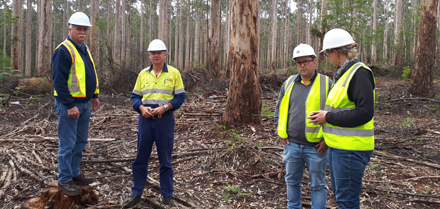
The Western Australian Regional Forest Agreement (RFA) has been extended for another 20 years with an annual sustainable yield of at least 191,000 cubic metres of high-quality jarrah and karri saw logs. The landmark RFA agreement for WA’s $1.4 billion was signed on Friday by the Prime Minister, Scott Morrison, and WA Premier Mark McGowan. Source: Philip Hopkins for Timberbiz
Matt Granger, acting chief executive of Forest Industry Federation WA, said the RFA was a key element in the regulatory architecture governing the timber industry.
“Forestry and timber industry stakeholders in WA have been waiting a long time for this extension and for the certainty it provides to allow them to plan and invest for the future,” he said.
The Australian Government’s Assistant Minister for Agriculture, Richard Colbeck, said the improved and extended RFA included five-year reviews. This would provide ongoing confidence in in forest management practices and a stable investment environment for the timber industry, Senator Colbeck said.
“We appreciate the work of the WA and Commonwealth Governments in consulting with stakeholders and implementing improvements to aspects of process relating to the RFA. This conclusion follows the completion of the NSW RFA last year and the Tasmanian RFA prior to that. Unfortunately, there is a delay on a final RFA in Victoria until at least next year,” AFPA Chief Executive Officer, Mr Ross Hampton said.
“With its 20-year rolling horizon, subject to five-yearly reviews, the extended WA RFA provides stability to the regulatory framework that is essential for investment and employment in WA’s $1.4 billion per year industry.”
The WA RFA recognises the state’s comprehensive, adequate and representative (CAR) reserve system in the South-West region. It provides for the sustainable management of public multi-use forests and plantations and for a long-term sustainable native forests products industry.
It is underpinned by the Forest Management Plan 2014-2023 (FMP), the primary framework for managing forests and plantations on public land in WA.
The FMP noted that harvesting in old-growth forest ended in 2001. The subsequent high level of reservation of mature forest had resulted in a higher proportion of smaller sized and lower quality logs from regrowth forests, it said.
The FMP/RFA sustainable yield modelling allows an average annual cut of 132,000 cubic metres of first and second grade jarrah sawlogs and 59,000m3 of karri first and second grade logs.
This in turn makes available up to 292,000m3 of other log volumes of jarrah, 164,000m3 of other volume karri, and 140,000m3 of all marri logs.
“Provision is also made for the potential level of yield that would arise from improved utilisation of available wood resources, particularly through the development of markets for lower grade logs,” the FMP says.
The WA Conservation Commission, based on a departmental review, can allow an upper limit annual cut. This is 160,000m3 of first and second grade jarrah sawlog, 59,000m3 of first and second grade kauri log, 520,000m3 of other jarrah logs, 164,000m3 of other karri logs, and 254,000m3 of all marri logs, the FMP says.
The FMP/RFA also provides for other forest produce such as public firewood, burls, craft wood, wildflowers, seeds and honey. It also covers plantations and ‘other exotics’, with the latter largely associated with mine site rehabilitation.
When the FMP was released, the then chairman, Brian Easton, said the sustainable yield modelling had had included the latest projections of climate change. In addition, a ‘safety margin’ had accounted for various risks to determine the limits of allowable harvesting.
Achieving a balance between the environment and forest industries for 10 years had been challenging.
“It has been demonstrated to the Conservation Commission that timber yields can continue to be sustained … through continued management of the forests,” he said.






